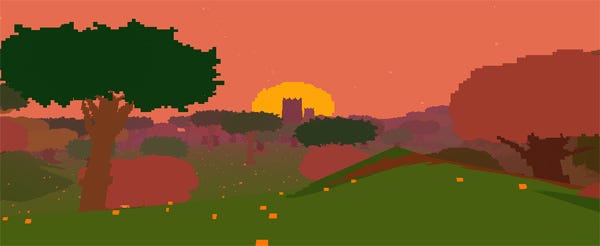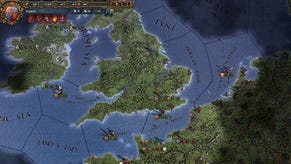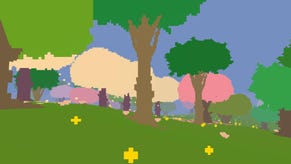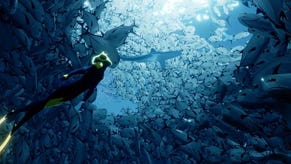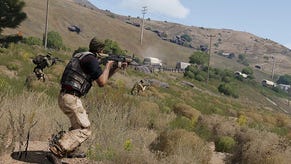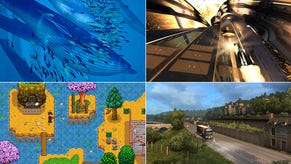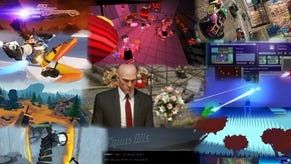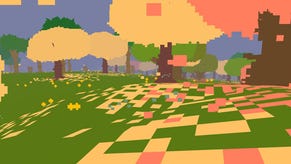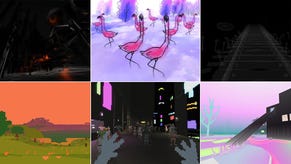Staying Humble: Proteus' Origins And Ed Key's Next Game
Nature Vs Nurture
Proteus is a warm, soothing bubble bath for the soul. The lo-fi first-person explorer lets players loose on an island that's one part rainbow dreamscape and another chirpy chiptune music maze. Basically, it's what I imagine nature lovers believe the outdoors to be, even though every real-life forest, hill, and tree is actually made entirely out of spiders. And yet, for all of Proteus' high-minded inventiveness, it certainly didn't start out that way. Creator Ed Key had to learn some very important lessons about, er, not being Skyrim before his first independently developed game traded bullets for butterflies, and – despite Proteus pulling in a fair deal of money – he's trying very hard to keep them in mind for his next game.
“The beginning of Proteus was weird, because it started out in lots of different places,” Key said during a recent interview with RPS. “There are some people working on a port right now, and they're finding all sorts of weird code like 'Battle Tester State' and other ridiculous stuff I'd forgotten about. Economies and things like that. It was going to be more of a procedural RPG with combat.”
“I was originally thinking it'd be a bit more like Skyrim or I guess Oblivion at the time. It would've been an RPG where you went to towns and did quests.”
So then, what happened? Well, you might remember that Oblivion and Skyrim were created by hundreds of people. Key – imposingly wholesome though his Peace Deity beard/chops combo might be – is just one man. Even with another creative tour de force, audiovisual maestro David Kanaga, in his corner, the game's development was shaping up to be a Herculean ordeal.
“It became obvious how much work I would've had to do procedurally,” he shrugged. “It's not like it's impossible, but it was just a lot and I wasn't even sure what the project was going to be. So I don't think Proteus was a reaction [to action-heavy games] originally. But it became apparent that it was possible to make something sort of nontraditional and non-violent.”
It's like the old (?) adage says: creativity emerges from constraints. Proteus rose from the ashes of its own limitations, and – in a conventional-wisdom-defying twist – it only got better as Key and Kanaga removed more and more traditional game elements. “Even beyond the point where it hit regular development and we got into the main body of it, there were a lot of things that went in and then came back out again because they didn't really stick. Like, I'd put stuff in and then David would play and find it to be too videogame-y,” Key explained.
And it worked. Proteus applied a light touch – a gentle stroke of minimalism – and nothing more. As a result, it stood out from the crowd, like a four-word poem in a forest of prose. But Key's got other ideas and influences flitting about in his noggin. Some – for instance, an X-Com-style tactics game – are even quite elaborate and traditional, and Key now has the means to realize them.
“Yeah, it's really strange [to have a lot more to work with],” he admitted. “Technically I could afford to hire artists and other things like that, and I really don't know what I'm going to do with that yet. It's hard to say.”
There's a difference, however, between picking up a few helping hands and opening up your own evil, serf-based game development volcano lair, and Key's not in any hurry to do the latter. He wants to make games that are inventive and personal, and in this case, bigger is only better until it fee-fi-fo-fums all over his vision.
“Certainly I'm not going to start a studio,” he said. “I don't feel comfortable growing that quickly. And just having been in the industry before, I like the idea of having complete control over the thing I'm doing. Even if it's not as broad in scope, your strength is the personal feeling you can put into it. That aspect is much more fragile when you get, like, 40 people working on it. It's a kind of luck of the draw thing as to whether you can get everyone moving in the same direction.”
“You'll have to ask me in two years, but I hope I learned a lesson from the early part of Proteus. I want to apply that to making something that's new and different, but not going off on, like, a five-year quest to simulate the entire solar system.”
So much for Proteus II: Everywhere Else, then. But where exactly does that leave Key? Well, he's begun work on a little something new, and it's probably not what you'd expect. It does have trees in it, though.
“I've started on some kind of basic prototypes. Something I want to do. It's like a boardgame-y, chunky, card-game-y kind of thing, but translated into videogame form. But I'm testing out the traditional gaming part of it and the aesthetic part of it right now. I had this idea for a part where one of the characters is ill and you're kind of playing the game to get him back. I mean, it's still kind of about 'plants are great' and nature and things. I figure there's still stuff to do in that sphere.”
Don't get the wrong idea, however: Proteus may still have a little life left in it. A morsel. A dew droplet. A seed. But that's enough – especially when mod tools could be involved.
“One of the big things about working on something like this is figuring out when you're happy with it,” Key sighed, weary yet proud. “And that's never gonna be when it's perfect. It's just about finding that point where you're broadly satisfied. Where you can sit back and say, 'Well, I think it's kind of OK.' And I do think Proteus kind of lends itself to additional things because it's so open. It could be, like, new features or crafting, fishing, or sailing. I don't want to do too many new things, though. Maybe something like a modding system, which is partly a priority.”
“But I didn't expect to have such a strong sense of closure on it when I released it. Much more than I expected to feel. So it just feels a bit hard to go back to it. That'll just leave me with more loose ends. It's kind of hard to disturb it now that it's settled. The short answer is that it's pretty much finished, but maybe there'll be a little more.”
